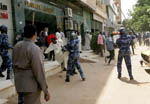
The violent government response to peaceful protests in Sudan last week is an alarming reminder that without external engagement, the Sudanese government is likely to continue a ruling strategy that has so far led to more conflict than peace in the country’s history.
Youth-led protests, triggered by economic and political frustrations, took place across major cities beginning last weekend, but were quickly shut down by the week’s end. The number of demonstrators was relatively small compared to protests in neighboring Egypt; initially, thousands turned out, and then the number of participants dropped into the hundreds late last week.
According to numerous news reports, Sudanese security forces responded to the largely peaceful protests with tear gas and beatings with water pipes and sticks, reportedly causing one student’s death. A handful of human rights groups have also reported on a large number of arrests—113 at one point, according to the Africa Center for Justice and Peace Studies. More alarming are the many individuals that remain in detention, with no communication to the outside and no rights guaranteed under Sudanese law.
“Sudanese authorities have long used national security powers to arrest and detain political activists, often mistreating or torturing them in detention (…),” warned Human Rights Watch in a statement following the protests. Opposition journalists have also been targeted.
The ruling National Congress Party’s response to the protests is only the latest indication that the Sudanese government will continue to curtail political space, violate human rights, and even commit war crimes, in order to maintain its control over the state and to enforce its vision of what Sudan should be. In a number of public remarks, Sudanese President Omar al-Bashir has said that he intends Sudan to be a Sharia-based Islamic state with no “diversity of culture and ethnicity” after secession. In a New York Times piece on the fate of the North, Bec Hamilton writes:
“The southern case against the N.C.P.’s vision of Sudan is well understood. Less appreciated are the longstanding efforts of many northerners to also reject the imposition of this unitary Islamic-Arab identity on “our beautiful Sudan.” For them, the south of the country has been a counterweight. (…) With the south now out of the equation, dissident northerners fear being left without allies at a critical moment in the battle to define their new country.”
So what allies do proponents of an inclusive and diverse Sudan in the North have? The U.S. would seem an obvious one. But in recent remarks from Secretary of State Hillary Clinton and Deputy Secretary of State Jim Steinberg, the need for good governance and multi-party democracy in only the new South was emphasized—the need for political reform in the new North was notably absent from the message.
The Obama administration has already pledged its biggest points of leverage toward solidifying a peaceful and smooth separation and improving conditions in Darfur. In the interest of stability, the U.S. government also seeks to reassure the Sudanese government of its political and economic wellbeing after secession. Simultaneously pressing for good governance in the North will be a difficult and delicate task. Nevertheless, it should be an integral piece of the U.S.’s policy toward Sudan going forward and understood as a necessary step toward preventing future conflict in Sudan.
Photo: Security forces beat protestors in Sudan. (Twitter)

